Starting a podcast, and keeping it running, is not an easy endeavor. If you want any hope of success, there are factors you have to weigh.
In this episode, Valher Media’s Charley Valher draws on his experience podcasting and managing podcasts to share tips for would-be podcasters.
Podcast: Download (Duration: 37:20 — 34.2MB)
Get Notified Of Future Episodes Apple Podcasts | Spotify | Amazon Music | Android | Blubrry | Gaana | TuneIn | Deezer | Anghami | RSS | More
In the podcast:
What kind of strategy insights can someone give who manages other people’s podcasts for a living? [03:53]
Charley lists three common misconceptions of business owners who podcast. [05:48]
Consistency amid changing world circumstances can actually be a good thing. [07:07]
Sometimes niching smaller and more specific is a good game play. [11:55]
How much of an expert should you be to have your own podcast? [16:43]
You CAN be several things at once and not confuse your audience. [21:14]
How do podcasts make money? Charley shares the approach he’s taken. [26:16]
Is there a plan beyond Charley’s current business model? [31:55]
Hopefully, this is what happens next…. [34:33]
Optimize your marketing strategy with James’s help
Charley Valher is a popular guest on the show, because he is right in the middle of what James and his clients do, which is building authority in the market.
Key to building authority, says James’s friend Ron Reich, is to author. We need to publish, to create content. And James has done a lot of that, not just with SuperFastBusiness but with past shows like ThinkActGet, SalesMarketingProfit and FreedomOcean.
Podcasts today are definitely a thing. James’s clients ask, Should I have a podcast? Do I do it as a brand or as a person? And, do I take it onto YouTube? Is it the same content?
This episode will deal with the media brand side of podcasting, and as a podcaster himself and owner of media company Valher Media, Charley is in a good position to offer his expertise.
Media brand strategy from a pro’s perspective
So how does a media guy like Charley sit down and plan out his media brands?
That’s a good question, says Charley. And to answer, he first wants to provide some context. Podcasting is a changing landscape that will continue to change. Five years ago, you could have simply published something on iTunes, and you would have gotten a degree of traction.
Not so now. If you haven’t got prior brand built, it’s unlikely you’ll achieve any kind of success. Charley spends a huge amount of time on research and testing, because clients of Valher Media want results, not old recipes that no longer work.
And on getting results, James has known Charley to tell people, You’re not looking for the right result, or, You’re actually answering the wrong question.
Charley can do that, as an expert in media with a good track record. In any given month, he looks behind the scenes of millions of downloads and views across multiple niches and brands. And he currently spends a couple of hundreds of thousands of dollars a month on ads, running and testing different things.
Are you laboring under these fallacies?
In his line of work, Charley comes up against some common misconceptions.
One is, if I just make more content, it will fix the problem. People think if they double the frequency of their episodes, it will double views or downloads. But what usually happens is the content gets watched by the same people, without attracting anyone new.
Another is the struggle with niche – how wide or narrow should you go? And when people get this wrong, they might get a few views, but no real fans, no one who will buy their stuff.
Then there’s, If I just make good content, people will buy my stuff. No calls to action, no links, not even telling people you have a product. All good and well, if your audience are Jedi mind readers.
When it’s good to stay on narrative
Charley has cautioned James about the niche one, when he was tempted to go broader. And during a period of months when SuperFastBusiness downloads doubled, he had an interesting theory to offer.
This was in the last couple of years, when world circumstances became interesting. What Charley noticed was that many podcasters left off their core premise and started following current events, which resulted in a drop-off in audience.
James, on the other hand, stayed consistent with his topics. People tuning in knew they’d still get content to help build their businesses.
Some influencers thought they should be putting forth their point of view and becoming the voice of how to deal with certain things, regardless of who leaves.
“You can’t please all of the people all of the time.”
James doesn’t know about that. He’d rather not turn off half his audience unnecessarily. There’s a saying, You can’t please all of the people all of the time. But James is happy to serve his audience regardless of many things, from beliefs to demographic, because business isn’t about that.
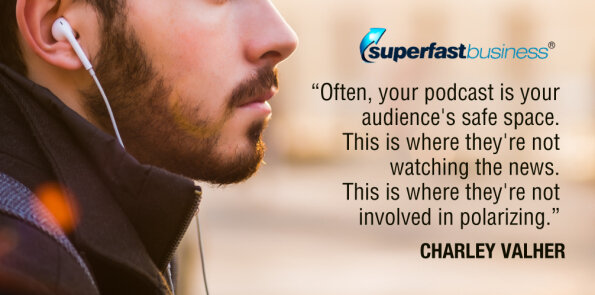
And think of this, says Charley: Often, your podcast is your audience’s safe space. This is where they’re not watching the news. This is where they’re not involved in polarizing. So don’t go bringing all that back in their face.
An example of effective niching
Going back to media brand, James wants to talk more about niche. He’s noticed Charley has a new podcast, Asset Blocks, a show about wealth creation for Australian businesses. That’s pretty specific, he thought. And he’d like to hear from Charley about his niche selection and the strategy behind it.
It is incredibly specific, says Charley. Because it’s a very different thing to build wealth in Australia if you are a business owner versus if you’re employed. And the rules differ from those of the US, especially around tax. And the markets are quite different in property or own shares, as well.
There are interesting dynamics not covered in other markets. And then also, the obvious one, to Charley, is that someone who has a PAYG, where as a business owner, you’ve got payroll and bills, your industry can change very, very quickly. So there are unique risk characteristics as well.
Charley is that market, he says. And going on the journey, he had a huge hunger for information but couldn’t find any. And having spotted that gap, he saw that no one was filling it well.
Valher Media looks after a number of big wealth creation shows in Australia, so Charley had a good idea of how big the market was. And the slice of the pie comprised of business owners was big enough to justify a media brand.
It was an underserved and very high-value market. There was the potential for sponsors or affiliate arrangements that Charley and his co-host could put together to make it worth it. They didn’t need an audience of millions.
How qualified do you have to be?
Now, Charley is doing a media brand, says James. It’s not about Charley, the investment guru or coach.
Yes, said Charley. He would almost go on the record saying people should not let him pick the investments for them.
In fact, Charley and his co-host have said that up until recently, the topic wasn’t a big thing for them. Whilst Charley has some strong financial acumen and personal experience, he has not been any kind of advisor.
So how do you build an audience, asks James? How do you even front up to the mic without feeling like a fake?
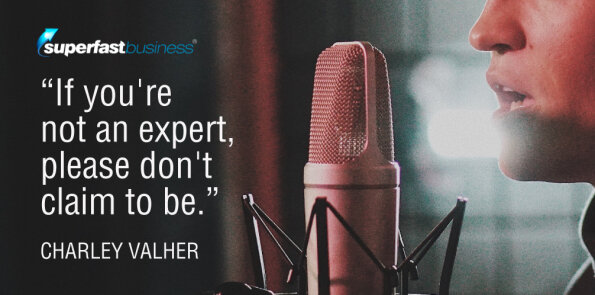 If you’re not an expert, please don’t claim to be, says Charley. You can take the expert position in the show or in a podcast, but you can also be the learner, or the student. So what he aims to do is be super transparent. The idea is, while he is not an expert, he has achieved some things personally that he’s happy to share.
If you’re not an expert, please don’t claim to be, says Charley. You can take the expert position in the show or in a podcast, but you can also be the learner, or the student. So what he aims to do is be super transparent. The idea is, while he is not an expert, he has achieved some things personally that he’s happy to share.
So he can say, These are my investments. This is where I’ve been able to get to by doing this. This is what worked for me, and this is what didn’t, with a very clear messaging. I hope you look at this, and it inspires you to start your journey, and that you will hire experts or have those types of conversations.
It’s about sharing what the results could look like, who are the right people to get help from, and educating the audience so they can have good conversations with people in that space.
“You’ve got to pay attention to who you’re getting advice from.”
James is put in mind of a financial planner at the bank, a fairly mature guy in a suit and tie, pitching wealth creation. He would not want to be in his 60s and still heading into the office. As his grandfather used to say, You’ve got to pay attention to who you’re getting advice from.
Do you risk confusing your audience?
Now, Charley has talked about niching, and specializing, and having a dedicated brand. And earlier in the podcast, he identified himself as a media expert. So wouldn’t having this other show confuse his audience? Who is Charley? Is he Asset Blocks’s wealth guy, or is he a media agency guy? This is relevant to James, as a business coach with a surfing website.
Why not be both, asks Charley? He goes deeper: it will create audience confusion in the beginning, but people will work out the difference. And if, in the process of rebranding, James at one point had two podcasts, people might wonder what he’s up to. But it might also make them pay more attention, to see how it plays out.
Nobody who knows James would be surprised if he did a surfing podcast. They probably wouldn’t listen to it, but then they’re not the audience in mind.
Says Charley, people would be wanting to understand, James is doing something new – is it for me? It just calls for better communication. So if James did a podcast episode talking about the new podcast and who it’s for and what it is, and If you want to check it out, go here, that would eliminate the confusion. And people are multifaceted, anyway. You can be a business guy who surfs.
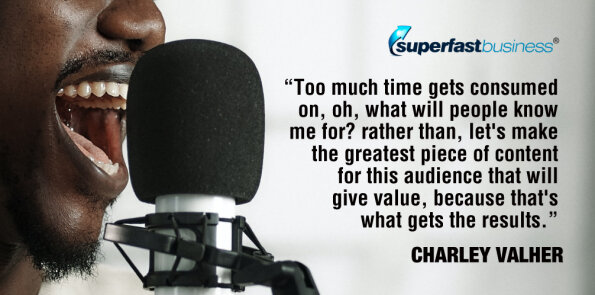 Charley thinks too much time gets consumed on, oh, what will people know me for? rather than, let’s make the greatest piece of content for this audience that will give value, because that’s what gets the results.
Charley thinks too much time gets consumed on, oh, what will people know me for? rather than, let’s make the greatest piece of content for this audience that will give value, because that’s what gets the results.
The business model to go with the brand
So Charley has seen the gap and gotten in there. He’s recognized there are enough people interested in it. But there’s also enough suppliers that he could actually create something that’s valuable for the market. Obviously, money will be connected to that at some point. Can he tell us about it?
Something Charley has identified in the wealth niche is that many of the people there are technically excellent, but they’re not good marketers, and they’re not good podcasters, and they don’t have that inclination.
So the business model they run across their media brands is doing sponsorships and affiliate stuff. Not too far from internet marketing in model, but done for a really high-value, specific audience.
“As an entrepreneur, you get ideas pretty much every day.”
A big market, says James. Lots of money floating around there. There’s always opportunities. Charley has said it before, as an entrepreneur, you get ideas pretty much every day. It’s the selection criteria and the sticktuitiveness that will make the difference between becoming a big brand or not.
Looking beyond the current play
Where does Charley go beyond sponsorships and affiliation? Is there other potential? Does he want to sell it for a lot of money one day or something else?
There is that potential, says Charley. And that’s where he thinks if you build yourself into a corner with a personal brand, it’s much harder to undo. So he’s thinking with the end in mind.
But talking it through, say they bring on a sponsor. The way they frame it up is there’s a sponsorship component, which is a monthly fee, that they can invest in the show. And then also, they want to do an affiliate model where if they produce a sale for that brand, they get a commission on it.
The second side of that is Charley brings some of his know-how from me dia land. So when they take a sponsor on, he wants to have them on the podcast. He doesn’t just want a rolling ad. He wants them to come on, talk about topics they can do.
And Charley considers himself a very reasonable podcast host. So he creates episodes where the sponsor shines, a special piece of content with them every quarter. And then his team will cut it up into clips and produce assets the sponsor can use in their own marketing or publishing, which, again, is not something they can easily get elsewhere.
So Charley has this very unique offering for people that want to reach the wealth community in Australia of business owners.
And then down the road – and this is the envisionment of why they’ve done it as a brand – is they want to do more shows. Potentially, there’s the Asset Blocks business owner edition, the Asset Blocks millennial edition, or surfer edition, or wherever they might go.
If you listen to this show, hopefully….
What would Charley like to happen as a result of someone listening to this show?
Number one, if they’re an Australian business owner, he highly recommends they come and check out the show at assetblocks.com.au, let him know what they think. Because he thinks it will help them a lot.
Second, if you’re not in that niche, but you’re thinking, how do I build out a media brand to support my business? Pay attention to what Charley is doing. This is what’s working well in the marketplace right now. It might give you a different view of how you can potentially run your own podcast or think about the business model around it.
Does Charley still do podcast show audits, asks James?
He does, though he had to slow down a bit because of the demand. If anyone visits valhermedia.com, there’s a big yellow button that says Podcast Audit. Select that, and Charley will go through all of your show, and share what he thinks is the best approach for you to achieve podcast success.
Join the community of thriving business owners inside JamesSchramko membership
Enjoyed the episode? Leave us a review on iTunes
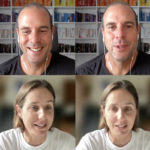
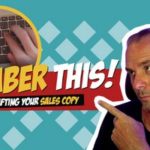







Leave a Reply